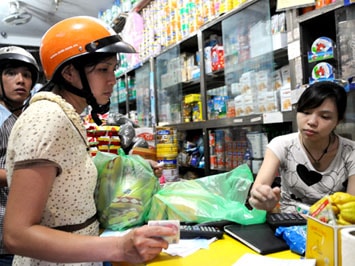Tax on plastic bags: People are indifferent, businesses face difficulties
For a long time, the use of plastic bags to store food, items and then littering has become a deep-rooted habit of the majority of Vietnamese people. Therefore, although the Law on Environmental Protection Tax has officially been in effect for nearly 2 months, according to the reporter's records at the people's markets in Hanoi, the use of plastic bags by housewives is still indiscriminate. Meanwhile, the businesses that produce this product are having a headache because of the price.
For a long time, the use of plastic bags to store food, items and then littering has become a deep-rooted habit of the majority of Vietnamese people. Therefore, although the Law on Environmental Protection Tax has officially been in effect for nearly 2 months, according to the reporter's records at the people's markets in Hanoi, the use of plastic bags by housewives is still indiscriminate. Meanwhile, the businesses that produce this product are having a headache because of the price.
Hard habit to break?
According to experts, plastic bags account for more than 10% of current waste and take more than 500 years to decompose. According to data published by the Department of Pollution Control of the Ministry of Natural Resources and Environment in 2010 (surveyed in 5 provinces and cities representing 3 regions), each household currently uses 223 plastic bags (equivalent to 1g/month). Environmental experts also said that plastic bags contain two substances, PE and PP, which when burned will create toxic gases. In addition, when storing hot food in plastic bags, these substances can penetrate the food, causing serious harm to the health of consumers. And from January 1, 2012, the Law on Environmental Protection Tax officially took effect, from here, plastic bags became one of the subjects subject to the highest tax of 100%, ranging from 30,000-50,000 VND/kg.

Plastic bags are still popular with many people. Photo: Quoc Anh
Present at some traditional markets around noon such as Mai Dong market, Mo market, Dong Tam market... the use of plastic bags by sellers and buyers is still a very common phenomenon. When asked, Ms. Lien - a trader at Mai Dong market shared that it is very difficult to limit the use of plastic bags because the demand of buyers is very large, they need to use it because it is so convenient. When limiting a type of product, another similar product is needed to replace it. However, currently, some environmentally friendly bag products are expensive, if sellers use them, they will inevitably have to push up the selling price. Meanwhile, even though they are taxed and have increased prices, plastic bags are still considered cheap, durable, light, and convenient. Meanwhile, Mr. Hung - a trader at Mo market said that the price of one kilogram of durable and beautiful plastic bags is currently around 40,000-45,000 VND, which is still lower than last year (down about 20,000 VND/kg). He explained this, saying that it could be because before the official tax was imposed, many sellers were afraid and bought goods to stock up, leading to a shortage of goods, pushing up the selling price.
Furthermore, not all sellers and buyers are aware of the tax on plastic bags to limit the use and production of bags. A seller in the alley of Kham Thien market frankly expressed: If we don't use plastic bags, what will we use to sell to customers? If we want to throw them away, we have to find something else to replace them. And just like that, the image of consumers going to the market, holding a few or even dozens of plastic bags in their hands, even if they only contain a lemon or a chili, is still a familiar image. Then, when their usefulness is over, these bags will become a component of environmental pollution. However, not all consumers are aware of this.
Businesses in trouble
The imposition of tax on plastic bags does not make consumers think at all, but the enterprises that produce and trade this item are having a "headache" because of the tax. On February 10, the Plastics Association held a press conference on the issue of taxing plastic bags. According to the opinions of enterprises in the Association, the tax has pushed enterprises into a state of confusion in production and business activities. Because Decree No. 67/2011/ND-CP, detailing and guiding the implementation of a number of articles of the Law on Environmental Protection Tax, clearly states that taxable plastic bags are bags and thin plastic packaging made from single plastic films of HDPE, LDPE or LLDPE, except for pre-packaged goods and plastic bags that meet the criteria of being environmentally friendly according to the regulations of the Ministry of Natural Resources and Environment. However, in reality, although the Law has been applied for nearly 2 months, this distinction is still very difficult, lacking clear criteria such as which type is subject to which tax rate, what is "pre-packaged goods"???... Especially, the tax will push up the cost of raw materials and from here, the price of products will also increase.
Currently, many countries in the world have laws banning and restricting the use of plastic bags to protect the environment, but that is when they have found a suitable solution to replace plastic bags. In our country, although there are environmentally friendly bags, the price of the product is a matter of discussion, so it is not possible to completely replace plastic bags. Moreover, the distinction between environmentally friendly plastic bags and polluting plastic bags is quite vague, causing many difficulties for people and businesses when changing habits or transferring technology.
According to Great Unity






